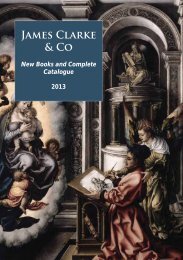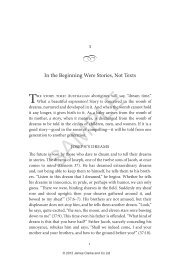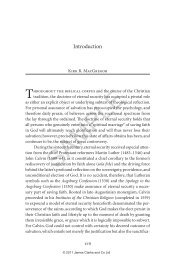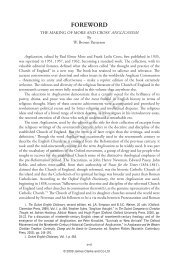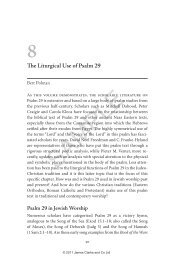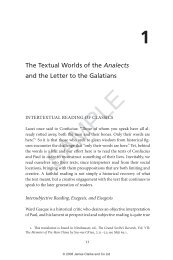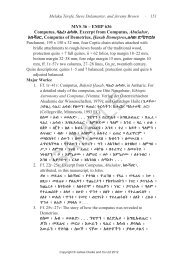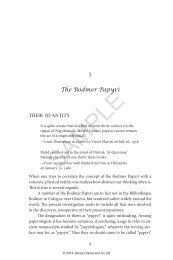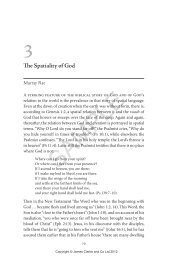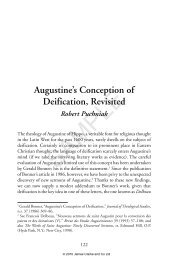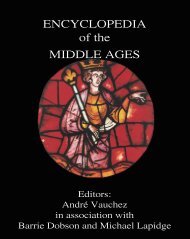Chapter 5: Cyprian, the "Pope" of Carthage - James Clarke and Co Ltd
Chapter 5: Cyprian, the "Pope" of Carthage - James Clarke and Co Ltd
Chapter 5: Cyprian, the "Pope" of Carthage - James Clarke and Co Ltd
Create successful ePaper yourself
Turn your PDF publications into a flip-book with our unique Google optimized e-Paper software.
5<br />
<strong>Cyprian</strong>, <strong>the</strong> “Pope” <strong>of</strong> <strong>Carthage</strong><br />
a committed life<br />
When referring to <strong>Cyprian</strong>, Jerome simply called him an African<br />
(<strong>Cyprian</strong>us Afer), which meant that he came from <strong>the</strong> Roman province <strong>of</strong><br />
Africa, later renamed Africa Proconsularis because it was governed by a<br />
proconsul. Based on o<strong>the</strong>r evidence from Lactantius, Augustine, Jerome,<br />
<strong>and</strong> <strong>Cyprian</strong>’s own writings, a great deal is known about <strong>Cyprian</strong>’s life—<br />
much more than what we know about his contemporaries. <strong>Co</strong>nsidered<br />
<strong>the</strong> Cicero <strong>of</strong> Latin Christianity, <strong>Cyprian</strong> was <strong>the</strong> first bishop to contribute<br />
to <strong>the</strong> African literary tradition.<br />
<strong>Cyprian</strong>’s writings include a corpus <strong>of</strong> eighty-four letters, which<br />
provide rich detail about his work as a bishop <strong>and</strong> his relationships<br />
with o<strong>the</strong>r clergy. Sixty-five <strong>of</strong> <strong>the</strong>se letters—six <strong>of</strong> which were conciliar<br />
letters in which he was <strong>the</strong> primary author—were written by <strong>Cyprian</strong><br />
while ano<strong>the</strong>r sixteen letters came from Roman clergy like Novatian <strong>and</strong><br />
<strong>Co</strong>rnelius, <strong>and</strong> were addressed to <strong>Cyprian</strong> or <strong>the</strong> Carthaginian clergy.<br />
While unfortunate that none <strong>of</strong> <strong>the</strong>se letters was dated internally, it is<br />
never<strong>the</strong>less helpful that each letter, except for two, included <strong>the</strong> name<br />
<strong>of</strong> its recipient. <strong>Cyprian</strong>’s correspondence, full <strong>of</strong> insights into his <strong>the</strong>ology,<br />
is complimented by thirteen small treatises written to <strong>the</strong> church at<br />
<strong>Carthage</strong>, some <strong>of</strong> which were essentially sermons. This collection <strong>of</strong> letters<br />
<strong>and</strong> treatises not only provides important evidence for underst<strong>and</strong>ing<br />
African church history, it also serves as an important milestone in<br />
Latin Christian literature. To be sure, <strong>Cyprian</strong> remained one <strong>of</strong> <strong>the</strong> most<br />
popular Christian authors well into <strong>the</strong> medieval period, <strong>and</strong> his works<br />
have survived to <strong>the</strong> present day via numerous manuscripts.<br />
In addition to <strong>the</strong>se primary sources, our underst<strong>and</strong>ing <strong>of</strong> <strong>Cyprian</strong>’s<br />
life is streng<strong>the</strong>ned by o<strong>the</strong>r key secondary sources from <strong>the</strong> period. First,<br />
SAMPLE<br />
69<br />
© 2011 <strong>James</strong> <strong>Clarke</strong> <strong>and</strong> <strong>Co</strong> <strong>Ltd</strong>
70 EARLY CHRISTIANITY IN NORTH AFRICA<br />
<strong>the</strong> Acta proconsularia is a very valuable document highlighting <strong>of</strong>ficial<br />
actions <strong>of</strong> <strong>the</strong> Roman authorities toward <strong>Cyprian</strong>, including his court appearances,<br />
interrogations, <strong>the</strong> judgments rendered by <strong>the</strong> Carthaginian<br />
governors, <strong>and</strong> his martyrdom. Secondly, <strong>the</strong> Life <strong>of</strong> <strong>Cyprian</strong>, <strong>the</strong> first<br />
work <strong>of</strong> its type in early Christian Latin literature, was written by a certain<br />
Pontius, a deacon from <strong>Carthage</strong> who lived with <strong>Cyprian</strong> during his<br />
exile until <strong>the</strong> time <strong>of</strong> his execution. Though Pontius was <strong>Cyprian</strong>’s contemporary<br />
<strong>and</strong> <strong>of</strong>fers an important eye witness account, his work seems<br />
to lose some historical value because <strong>of</strong> its devotional <strong>and</strong> edifying purpose.<br />
Hence, <strong>the</strong> work functions as a panegyric to honor <strong>Cyprian</strong>’s holy<br />
example—that “this incomparable <strong>and</strong> l<strong>of</strong>ty pattern may be prolonged<br />
into immortal remembrance.” 1<br />
While <strong>the</strong>se sources provide an accurate underst<strong>and</strong>ing <strong>of</strong> <strong>Cyprian</strong>’s<br />
life during his ten years as bishop (249–258), his pre-conversion life is<br />
quite unknown. Though named Caecilius <strong>Cyprian</strong>us, he also went by<br />
Thascius. While it cannot be confirmed with certainty, <strong>Cyprian</strong> was<br />
probably born in <strong>Carthage</strong>. According to Pontius, he lived in a villa<br />
with gardens in <strong>Carthage</strong>—a home that he owned—which gives <strong>the</strong><br />
impression that he had always lived <strong>the</strong>re. Though his date <strong>of</strong> birth is<br />
unknown—even Augustine was unaware <strong>of</strong> it—we can plausibly suggest<br />
that it was sometime around 210. Finally, <strong>Cyprian</strong> does not seem to have<br />
had a personal relationship with Tertullian, his “master” who probably<br />
died around 222.<br />
A man <strong>of</strong> great financial means, <strong>Cyprian</strong> certainly belonged to<br />
<strong>the</strong> rich <strong>and</strong> cultivated bourgeoisie in <strong>Carthage</strong>. Jerome recorded that<br />
<strong>Cyprian</strong>, born into paganism, was initially “a defender <strong>of</strong> idolatry.” After<br />
receiving a comprehensive education, <strong>Cyprian</strong> was on <strong>the</strong> path to success,<br />
<strong>and</strong> his background <strong>and</strong> training gave him access to <strong>the</strong> pomp <strong>and</strong><br />
splendor <strong>of</strong> <strong>the</strong> highest ranks <strong>of</strong> <strong>the</strong> Roman administration. A brilliant<br />
communicator who had mastered <strong>the</strong> rules <strong>of</strong> rhetoric <strong>and</strong> eloquence,<br />
<strong>Cyprian</strong> developed quite a reputation in <strong>Carthage</strong>, where he may have<br />
practiced law for a time. It is also likely that he held a position in <strong>the</strong> civil or<br />
municipal administration. Though not possessing Tertullian’s legal mind,<br />
<strong>Cyprian</strong>’s writings do reveal a level <strong>of</strong> judicial expertise that he would put<br />
to use in his career as a bishop. <strong>Cyprian</strong> also enjoyed an elegant lifestyle<br />
SAMPLE<br />
1. Pontius Life <strong>of</strong> <strong>Cyprian</strong> 1. [All English translations <strong>of</strong> Life <strong>of</strong> <strong>Cyprian</strong> are from<br />
ANF 5.]<br />
© 2011 <strong>James</strong> <strong>Clarke</strong> <strong>and</strong> <strong>Co</strong> <strong>Ltd</strong>
<strong>Cyprian</strong>, <strong>the</strong> “Pope” <strong>of</strong> <strong>Carthage</strong><br />
71<br />
with fine food, luxury, <strong>and</strong> pleasure, <strong>and</strong> his circle <strong>of</strong> friends included <strong>the</strong><br />
leading pagans <strong>of</strong> <strong>Carthage</strong>. He probably maintained <strong>the</strong>se friendships<br />
after his consecration as bishop, which perhaps explains <strong>the</strong> respect he<br />
comm<strong>and</strong>ed from police <strong>and</strong> magistrates during his arrests <strong>and</strong> periods<br />
<strong>of</strong> interrogation. To be sure, <strong>the</strong> conversion <strong>of</strong> this rich member <strong>of</strong> <strong>the</strong><br />
social elite came as a shock to <strong>Carthage</strong>’s high society.<br />
Jerome, commenting once more on <strong>Cyprian</strong>’s life, added: “It was<br />
under <strong>the</strong> influence <strong>of</strong> <strong>the</strong> priest, Caecilius, from whom he received his<br />
name, that <strong>Cyprian</strong> became a Christian <strong>and</strong> donated his wealth to <strong>the</strong><br />
poor.” 2 <strong>Cyprian</strong> was probably baptized around 246. Setting a precedent for<br />
Augustine’s later confessional-style autobiography, <strong>Cyprian</strong> recounted <strong>the</strong><br />
steps in his conversion at <strong>the</strong> outset <strong>of</strong> his treatise to his friend Donatus,<br />
probably one <strong>of</strong> <strong>Cyprian</strong>’s former colleagues in <strong>the</strong> legal pr<strong>of</strong>ession:<br />
While I was still lying in darkness <strong>and</strong> gloomy night, wavering<br />
hi<strong>the</strong>r <strong>and</strong> thi<strong>the</strong>r, tossed about on <strong>the</strong> foam <strong>of</strong> this boastful age,<br />
<strong>and</strong> uncertain <strong>of</strong> my w<strong>and</strong>ering steps, knowing nothing <strong>of</strong> my<br />
real life, <strong>and</strong> remote from truth <strong>and</strong> light, I used to regard it as a<br />
difficult matter, <strong>and</strong> especially as difficult in respect <strong>of</strong> my character<br />
at that time, that a man should be capable <strong>of</strong> being born<br />
again . . . These were my frequent thoughts. For as I myself was<br />
held in bonds by <strong>the</strong> innumerable errors <strong>of</strong> my previous life, from<br />
which I did not believe that I could by possibility be delivered, so<br />
I was disposed to acquiesce in my clinging vices; <strong>and</strong> because I<br />
despaired <strong>of</strong> better things, I used to indulge my sins as if <strong>the</strong>y were<br />
actually parts <strong>of</strong> me, <strong>and</strong> indigenous to me. 3<br />
SAMPLE<br />
Upon his conversion, <strong>Cyprian</strong> took a vow <strong>of</strong> celibacy, renouncing <strong>the</strong><br />
worldly pleasures that had characterized his previous life, <strong>and</strong> donated<br />
his earthly belongings to <strong>the</strong> poor <strong>and</strong> to <strong>the</strong> church. He probably paid a<br />
greater price by breaking with his worldly “masters,” <strong>the</strong> classical authors<br />
<strong>of</strong> Greek <strong>and</strong> Latin literature. From this point on, he had but two masters<br />
that he consulted daily—<strong>the</strong> Bible <strong>and</strong> Tertullian. Though occupying a<br />
place <strong>of</strong> prominence <strong>and</strong> authority as bishop <strong>of</strong> <strong>Carthage</strong>, <strong>Cyprian</strong> lived<br />
<strong>and</strong> conducted himself quite humbly. Despite this simplicity, he was still<br />
very much a man <strong>of</strong> action, which propelled <strong>the</strong> African pastor to a place<br />
<strong>of</strong> renown among <strong>the</strong> leaders <strong>of</strong> <strong>the</strong> Christian movement <strong>of</strong> his day.<br />
2. Jerome Lives <strong>of</strong> Illustrious Men 67 [English translation my own].<br />
3. <strong>Cyprian</strong> To Donatus 3–4.<br />
© 2011 <strong>James</strong> <strong>Clarke</strong> <strong>and</strong> <strong>Co</strong> <strong>Ltd</strong>
72 EARLY CHRISTIANITY IN NORTH AFRICA<br />
Shortly after his baptism in 246, he was set apart to <strong>the</strong> priesthood<br />
by Bishop Donatus, his predecessor in <strong>Carthage</strong>. In early 249, <strong>Cyprian</strong><br />
was consecrated as bishop <strong>and</strong> became <strong>the</strong> “pope” <strong>of</strong> <strong>Carthage</strong>—a title<br />
signifying <strong>the</strong> bishop’s fa<strong>the</strong>rly <strong>and</strong> spiritual care for <strong>the</strong> flock entrusted<br />
to him. Not reserved uniquely for <strong>the</strong> bishop <strong>of</strong> Rome, this distinction<br />
was also used to address bishops in Asia Minor <strong>and</strong> Alex<strong>and</strong>ria. <strong>Cyprian</strong><br />
was called pope not only by his congregation, but also by some Roman<br />
clergy. 4 In a letter denouncing Felicissimus <strong>and</strong> <strong>the</strong> five priests who led<br />
a schism during <strong>the</strong> Decian persecution, <strong>Cyprian</strong> referred to his own<br />
episcopal election <strong>and</strong> this fa<strong>the</strong>rly authority <strong>of</strong> a bishop: “<strong>the</strong>re is a man<br />
who is appointed bishop in <strong>the</strong> place <strong>of</strong> a deceased bishop; he is chosen<br />
in time <strong>of</strong> peace by <strong>the</strong> vote <strong>of</strong> <strong>the</strong> entire congregation . . . it can only be<br />
<strong>the</strong> adversary <strong>of</strong> Christ <strong>and</strong> <strong>the</strong> enemy <strong>of</strong> his church who is hounding <strong>the</strong><br />
appointed leader in <strong>the</strong> church with his attacks.” 5<br />
Due to his abilities as an administrator <strong>and</strong> <strong>the</strong>ologian, <strong>Cyprian</strong><br />
was a solid spiritual leader for <strong>the</strong> church at <strong>Carthage</strong>, to which he gave<br />
himself first <strong>and</strong> foremost. He was also an influential advisor to churches<br />
in Spain <strong>and</strong> Gaul, who addressed <strong>the</strong>ir problems to <strong>the</strong> African church<br />
councils overseen by <strong>Cyprian</strong>. As an administrator, <strong>Cyprian</strong> tirelessly<br />
gave himself to <strong>the</strong> clergy <strong>and</strong> people <strong>of</strong> <strong>Carthage</strong>. He also left a corpus<br />
<strong>of</strong> important <strong>the</strong>ological writings, which on one h<strong>and</strong>, were written in<br />
clear <strong>and</strong> sober pastoral manner, yet on <strong>the</strong> o<strong>the</strong>r, possessed all <strong>of</strong> <strong>the</strong><br />
passion <strong>of</strong> Tertullian <strong>and</strong> <strong>the</strong> African tradition. Thus, by <strong>of</strong>ten alluding to<br />
military imagery in his writings, he influenced African <strong>the</strong>ology toward<br />
a “militant spirituality.”<br />
a champion <strong>of</strong> unity<br />
SAMPLE<br />
<strong>Cyprian</strong>’s treatise On <strong>the</strong> Unity <strong>of</strong> <strong>the</strong> Church was probably published in<br />
<strong>the</strong> spring <strong>of</strong> 251. The most influential <strong>of</strong> all <strong>of</strong> his works, it was read aloud<br />
at <strong>the</strong> council <strong>of</strong> <strong>Carthage</strong> in 251. It is also <strong>the</strong> work that best captured<br />
<strong>Cyprian</strong>’s personality. The schisms set <strong>of</strong>f by Novatus <strong>and</strong> Felicissimus,<br />
which had succeeded in dividing <strong>the</strong> <strong>Carthage</strong> church, gave <strong>Cyprian</strong> <strong>the</strong><br />
occasion to write this exhortation. Addressed not only to <strong>Cyprian</strong>’s clergy<br />
<strong>and</strong> flock, its recipients also included confessors in Rome who were still<br />
4. Cf. <strong>Cyprian</strong> Letters 30, 36.<br />
5. <strong>Cyprian</strong> Letter 59.6.<br />
© 2011 <strong>James</strong> <strong>Clarke</strong> <strong>and</strong> <strong>Co</strong> <strong>Ltd</strong>
<strong>Cyprian</strong>, <strong>the</strong> “Pope” <strong>of</strong> <strong>Carthage</strong><br />
73<br />
following Novatian. Like On <strong>the</strong> Lapsed, which had confronted apostasy<br />
during <strong>the</strong> Decian persecution, On <strong>the</strong> Unity <strong>of</strong> <strong>the</strong> Church was prompted<br />
by <strong>the</strong> circumstances surrounding schism <strong>and</strong> written in <strong>the</strong> context <strong>of</strong><br />
several church councils dealing with this issue.<br />
<strong>Cyprian</strong> believed that unity, a value that he championed until his<br />
own martyrdom, ought to be a bishop’s chief concern, because unity was<br />
<strong>the</strong> primary characteristic <strong>of</strong> <strong>the</strong> Christian faith. <strong>Cyprian</strong> wrote, “Can he<br />
who is not bound to <strong>the</strong> unity <strong>of</strong> <strong>the</strong> church, believe himself to be bound<br />
to <strong>the</strong> faith? Can one who opposes <strong>the</strong> church be certain that he is also<br />
in <strong>the</strong> church? One cannot even be a martyr if he is not in <strong>the</strong> church.”<br />
<strong>Cyprian</strong> was convinced that outside <strong>of</strong> <strong>the</strong> church, falsehood <strong>and</strong> impiety<br />
reigned, <strong>and</strong> that salvation could only be experienced within <strong>the</strong> context<br />
<strong>of</strong> <strong>the</strong> church: “We cannot have God for our fa<strong>the</strong>r without <strong>the</strong> church as<br />
our mo<strong>the</strong>r. He, who does not maintain unity, fails to keep God’s law <strong>and</strong><br />
rejects faith in <strong>the</strong> Fa<strong>the</strong>r <strong>and</strong> <strong>the</strong> Son.” 6 As signs pointing to <strong>the</strong> Lord’s<br />
imminent return abounded—a millenarian position already defended by<br />
Tertullian—those outside <strong>of</strong> <strong>the</strong> fold were urged to return immediately to<br />
communion or risk perishing. <strong>Cyprian</strong> argued that church unity should<br />
be affirmed on several levels.<br />
First, during <strong>the</strong> Decian persecution, <strong>Cyprian</strong> asserted that Christian<br />
unity (concordia) was expressed through corporate prayer. He wrote to<br />
<strong>the</strong> priests <strong>and</strong> deacons <strong>of</strong> his diocese:<br />
Every one <strong>of</strong> us should pray to God not for himself only, but for<br />
all his bro<strong>the</strong>rs, just as <strong>the</strong> Lord taught us to pray. His instructions<br />
are not for each <strong>of</strong> us to pray privately but he bade that when we<br />
pray we should do so with united hearts in communal prayer for<br />
everyone. If <strong>the</strong> Lord shall observe that we are humble <strong>and</strong> peaceable,<br />
joined in union toge<strong>the</strong>r, fearful <strong>of</strong> his wrath, chastened <strong>and</strong><br />
amended by <strong>the</strong> present sufferings, He will make us safe from <strong>the</strong><br />
assaults <strong>of</strong> <strong>the</strong> enemy. 7<br />
SAMPLE<br />
These arguments are also supported in <strong>Cyprian</strong>’s treatise On <strong>the</strong><br />
Lord’s Prayer, a work written as <strong>Cyprian</strong> was going into hiding during<br />
<strong>the</strong> Decian persecution. He refers to <strong>the</strong> apostles’ practice <strong>of</strong> corporate<br />
prayer: “They continued with one accord in prayer, declaring both by <strong>the</strong><br />
urgency <strong>and</strong> by <strong>the</strong> agreement <strong>of</strong> <strong>the</strong>ir praying, that God, ‘who makes<br />
6. [English translation my own.]<br />
7. <strong>Cyprian</strong> Letter 11.7.3.<br />
© 2011 <strong>James</strong> <strong>Clarke</strong> <strong>and</strong> <strong>Co</strong> <strong>Ltd</strong>
74 EARLY CHRISTIANITY IN NORTH AFRICA<br />
men to dwell <strong>of</strong> one mind in a house,’ only admits into <strong>the</strong> divine <strong>and</strong><br />
eternal home those among whom prayer is unanimous.” 8<br />
In On <strong>the</strong> Unity <strong>of</strong> <strong>the</strong> Church, <strong>Cyprian</strong> specified fur<strong>the</strong>r that unity<br />
was not dependent upon <strong>the</strong> number <strong>of</strong> believers ga<strong>the</strong>red toge<strong>the</strong>r:<br />
When, <strong>the</strong>refore, in His comm<strong>and</strong>ments He lays it down, <strong>and</strong><br />
says, “Where two or three are ga<strong>the</strong>red toge<strong>the</strong>r in my name, I<br />
am with <strong>the</strong>m,” He does not divide men from <strong>the</strong> church, seeing<br />
that He Himself ordained <strong>and</strong> made <strong>the</strong> Church; but rebuking <strong>the</strong><br />
faithless for <strong>the</strong>ir discord, <strong>and</strong> commending peace by His word<br />
to <strong>the</strong> faithful, He shows that He is ra<strong>the</strong>r with two or three who<br />
pray with one mind, than with a great many who differ, <strong>and</strong> that<br />
more can be obtained by <strong>the</strong> concordant prayer <strong>of</strong> a few, than by<br />
<strong>the</strong> discordant supplication <strong>of</strong> many. 9<br />
This practice does not simply refer to a prayer ga<strong>the</strong>ring <strong>of</strong> a few<br />
Christians; ra<strong>the</strong>r, <strong>Cyprian</strong> alludes to <strong>the</strong> united “Catholic prayer” <strong>of</strong> <strong>the</strong><br />
entire church.<br />
As Novatian worked to attract more believers into his schismatic<br />
movement in 251, ano<strong>the</strong>r aspect or level <strong>of</strong> church unity (concordia)<br />
was raised—<strong>the</strong> unity <strong>of</strong> <strong>the</strong> bishops. In dealing with <strong>the</strong> problem <strong>of</strong> <strong>the</strong><br />
lapsed, <strong>Cyprian</strong> had already requested that <strong>the</strong> clergy demonstrate <strong>the</strong>ir<br />
unity by adopting a united stance on <strong>the</strong> issue. In a letter to priests <strong>and</strong><br />
deacons at Rome, he wrote: “You should read <strong>the</strong>se same letters also to<br />
any <strong>of</strong> my colleagues who may be present with you or who may come<br />
later. In this way, we may act in unison <strong>and</strong> harmony, adhering to <strong>the</strong><br />
same health-giving measures for healing <strong>and</strong> curing <strong>the</strong> wounds <strong>of</strong> <strong>the</strong><br />
fallen.” 10 <strong>Cyprian</strong> constantly urged <strong>the</strong> bishops to be united so <strong>the</strong>y could<br />
speak with one voice for <strong>the</strong> universal church. For instance, <strong>Co</strong>rnelius’<br />
election as bishop <strong>of</strong> Rome over Novatian was legitimized because <strong>of</strong> <strong>the</strong><br />
“testimony <strong>of</strong> his episcopal colleagues, all <strong>of</strong> whom were in unanimous<br />
agreement.” 11 Hence, <strong>the</strong> church’s universality <strong>and</strong> catholicity was determined<br />
by <strong>the</strong> unity <strong>of</strong> its bishops.<br />
A difficult question is raised in <strong>the</strong> fourth chapter <strong>of</strong> On <strong>the</strong> Unity <strong>of</strong><br />
<strong>the</strong> Church—a chapter that exists in variant manuscripts, itself an unre-<br />
SAMPLE<br />
8. <strong>Cyprian</strong> On <strong>the</strong> Lord’s Prayer 8.<br />
9. <strong>Cyprian</strong> On <strong>the</strong> Unity <strong>of</strong> <strong>the</strong> Church 12.<br />
10. <strong>Cyprian</strong> Letter 34.31.<br />
11. <strong>Cyprian</strong> Letter 8.1 [English translation my own].<br />
© 2011 <strong>James</strong> <strong>Clarke</strong> <strong>and</strong> <strong>Co</strong> <strong>Ltd</strong>
<strong>Cyprian</strong>, <strong>the</strong> “Pope” <strong>of</strong> <strong>Carthage</strong><br />
75<br />
solved controversy. In what is probably <strong>the</strong> oldest manuscript—or at least,<br />
as some argue, a text unaffected by later “additions”—<strong>Cyprian</strong> speaks <strong>of</strong><br />
“<strong>the</strong> chair <strong>of</strong> Peter” <strong>and</strong> <strong>of</strong> <strong>the</strong> “primacy <strong>of</strong> Peter.” The text in question<br />
continues: “Although Christ gave all <strong>of</strong> <strong>the</strong> apostles <strong>the</strong> same authority, he<br />
never<strong>the</strong>less established but one episcopal chair. Set apart on account <strong>of</strong><br />
Christ’s authority, this chair is <strong>the</strong> heart <strong>and</strong> reason for unity.” In founding<br />
his church on Peter, Jesus clearly <strong>and</strong> concretely presented a case for<br />
unity—<strong>the</strong> essential quality <strong>and</strong> greatest goal for <strong>the</strong> church. That said,<br />
though <strong>the</strong> bishop <strong>of</strong> Rome in some respects served as a communication<br />
link between bishops <strong>and</strong> “personified” <strong>the</strong> unity <strong>of</strong> <strong>the</strong> church, he had no<br />
<strong>of</strong>ficial delegation to speak or decide on his behalf.<br />
While <strong>the</strong> mission to teach, signified by <strong>the</strong> notion <strong>of</strong> “chair” (ca<strong>the</strong>dra),<br />
was first given to Peter, it was also conferred with <strong>the</strong> same authority<br />
on all <strong>of</strong> <strong>the</strong> apostles: “The o<strong>the</strong>r apostles were <strong>the</strong> same as Peter except<br />
that Peter occupied a primal place <strong>of</strong> authority (primatus). This shows<br />
that <strong>the</strong>re is but one church <strong>and</strong> one seat <strong>of</strong> authority. All <strong>of</strong> <strong>the</strong> apostles<br />
are good shepherds, yet <strong>the</strong>re is one single flock that is led in one accord<br />
out to pasture. This unity must be firmly defended, especially by those <strong>of</strong><br />
us who are bishops.” 12 On <strong>the</strong> basis <strong>of</strong> <strong>the</strong> earlier text <strong>of</strong> On <strong>the</strong> Unity <strong>of</strong><br />
<strong>the</strong> Church, Peter’s primacy emerges as a symbol <strong>of</strong> <strong>and</strong> exhortation to<br />
unity. While Rome’s privileged position could be likened to <strong>the</strong> rights <strong>of</strong><br />
a firstborn, or conferred due to its ecclesiastical seniority, it did not mean<br />
that <strong>the</strong> Roman bishop had authority <strong>and</strong> jurisdiction over his episcopal<br />
colleagues.<br />
In a later redaction <strong>of</strong> On <strong>the</strong> Unity <strong>of</strong> <strong>the</strong> Church—regarded by<br />
some as <strong>the</strong> only text written by <strong>Cyprian</strong>—<strong>the</strong> term “primacy” does not<br />
appear <strong>and</strong> more emphasis is placed on <strong>the</strong> apostle’s equality. The following<br />
citation from John’s Gospel shows <strong>the</strong> apostles on equal footing:<br />
“‘As <strong>the</strong> Fa<strong>the</strong>r has sent me, even so I am sending you.’ And when he<br />
had said this, he brea<strong>the</strong>d on <strong>the</strong>m <strong>and</strong> said to <strong>the</strong>m, ‘Receive <strong>the</strong> Holy<br />
Spirit. If you forgive <strong>the</strong> sins <strong>of</strong> any, <strong>the</strong>y are forgiven <strong>the</strong>m; if you withhold<br />
forgiveness from any, it is withheld’” (John 20:21–23). Peter’s powers<br />
are declared identical to those <strong>of</strong> <strong>the</strong> o<strong>the</strong>r apostles, in content as well as<br />
importance: “Assuredly <strong>the</strong> rest <strong>of</strong> <strong>the</strong> apostles were also <strong>the</strong> same as was<br />
Peter, endowed with a like partnership both <strong>of</strong> honor <strong>and</strong> power.” 13<br />
SAMPLE<br />
12. <strong>Cyprian</strong> On <strong>the</strong> Unity <strong>of</strong> <strong>the</strong> Church 4–5 [English translation my own].<br />
13. <strong>Cyprian</strong> On <strong>the</strong> Unity <strong>of</strong> <strong>the</strong> Church 4.<br />
© 2011 <strong>James</strong> <strong>Clarke</strong> <strong>and</strong> <strong>Co</strong> <strong>Ltd</strong>
76 EARLY CHRISTIANITY IN NORTH AFRICA<br />
Certainly, both versions <strong>of</strong> <strong>the</strong> text could have been written by<br />
<strong>Cyprian</strong>, under different circumstances. The harsh conflict over <strong>the</strong> rebaptism<br />
<strong>of</strong> heretics that took place between <strong>Cyprian</strong> <strong>and</strong> Bishop Stephen<br />
could provide an explanation in <strong>the</strong> changes to On <strong>the</strong> Unity <strong>of</strong> <strong>the</strong> Church.<br />
Never<strong>the</strong>less, it should be noted that nei<strong>the</strong>r text asserts that Peter or his<br />
successors have authority <strong>and</strong> jurisdiction over <strong>the</strong> universal church.<br />
According to <strong>Cyprian</strong>, next to Christ’s eminent authority, <strong>the</strong><br />
Catholic church’s greatest source <strong>of</strong> authority was <strong>the</strong> united collegium<br />
<strong>of</strong> bishops speaking with one voice in Christ’s name. This notion <strong>of</strong> collegiality<br />
was especially developed among <strong>the</strong> African church leaders as<br />
bishops were elected by <strong>the</strong> clergy <strong>and</strong> laity <strong>and</strong> were later consecrated<br />
by o<strong>the</strong>r key provincial bishops. Hence, <strong>the</strong> bishop <strong>of</strong> Rome was not empowered<br />
with <strong>the</strong> authority to single-h<strong>and</strong>edly make doctrinal or disciplinary<br />
decisions for <strong>the</strong> entire church. Firmilian’s harsh words regarding<br />
Stephen have been noted: “to cut himself <strong>of</strong>f from <strong>the</strong> unity <strong>of</strong> charity,<br />
to alienate himself from his brethren in everything.” 14 The Holy Spirit<br />
should serve as <strong>the</strong> ultimate guide <strong>and</strong> judge for <strong>the</strong> universal church, not<br />
<strong>the</strong> church at Rome. Thus, if <strong>the</strong> Roman bishop cut himself <strong>of</strong>f from <strong>the</strong><br />
church, which speaks through its unified body <strong>of</strong> bishops, it is imperative<br />
for <strong>the</strong> sake <strong>of</strong> unity that he be shown <strong>the</strong> error <strong>of</strong> his ways. In condemning<br />
Marcianus <strong>of</strong> Arles, <strong>Cyprian</strong> had already written: “it is plainly evident<br />
that a man does not hold <strong>the</strong> truth <strong>of</strong> <strong>the</strong> Holy Spirit with <strong>the</strong> rest <strong>of</strong> his<br />
colleagues when we find that his opinions are different from <strong>the</strong>irs.” 15<br />
Despite consistently affirming <strong>the</strong> rights <strong>of</strong> bishops from outside influences,<br />
<strong>Cyprian</strong> showed some inconsistency in this area as he solicited<br />
Rome’s intervention at times on certain matters. For instance, indignant<br />
over Novatus <strong>and</strong> o<strong>the</strong>r Carthaginian schismatics attempting to win <strong>the</strong><br />
Roman bishop to <strong>the</strong>ir view, <strong>Cyprian</strong> wrote: “<strong>the</strong>y now have <strong>the</strong> audacity<br />
to sail <strong>of</strong>f carrying letters from schismatics <strong>and</strong> outcasts from religion<br />
even to <strong>the</strong> chair <strong>of</strong> Peter, to <strong>the</strong> primordial church, <strong>the</strong> very source <strong>of</strong><br />
episcopal unity.” 16 While turning to Stephen for help in confronting <strong>the</strong><br />
Novatianist Bishop Marcianus, <strong>Cyprian</strong> actually gave <strong>the</strong> Roman bishop<br />
directions for how to proceed in <strong>the</strong> matter: “I exhort you, <strong>the</strong>refore, to<br />
direct letters to that province <strong>and</strong> to <strong>the</strong> faithful who dwell at Arles, urging<br />
that after Marcianus has been excommunicated, a successor be appointed<br />
SAMPLE<br />
14. <strong>Cyprian</strong> Letter 75.25.2.<br />
15. <strong>Cyprian</strong> Letter 68.5.<br />
16. <strong>Cyprian</strong> Letter 59.14.<br />
© 2011 <strong>James</strong> <strong>Clarke</strong> <strong>and</strong> <strong>Co</strong> <strong>Ltd</strong>
<strong>Cyprian</strong>, <strong>the</strong> “Pope” <strong>of</strong> <strong>Carthage</strong><br />
77<br />
in his place.” 17 Though <strong>Cyprian</strong> appealed to <strong>the</strong> pope in this matter, he<br />
never asked him to get involved with an issue facing <strong>the</strong> African church.<br />
As <strong>the</strong> apostles were considered Peter’s equals—“endowed with<br />
a like partnership both <strong>of</strong> honor <strong>and</strong> power”—bishops also shared <strong>the</strong><br />
same episcopal authority. <strong>Cyprian</strong> wrote: “In his [Christ’s] view <strong>the</strong><br />
church consists <strong>of</strong> <strong>the</strong> people who remain united with <strong>the</strong>ir bishop, it is<br />
<strong>the</strong> flock that stays by its shepherd. By that you realize that <strong>the</strong> bishop is<br />
in <strong>the</strong> church <strong>and</strong> <strong>the</strong> church is in <strong>the</strong> bishop, <strong>and</strong> whoever is not with<br />
<strong>the</strong> bishop is not in <strong>the</strong> church.” 18 Thus, it appears that <strong>Cyprian</strong> became<br />
<strong>the</strong> leading voice for episcopal authority in <strong>the</strong> church. Following <strong>the</strong><br />
two significant church crises that also raised <strong>the</strong>ological questions—<strong>the</strong><br />
problem <strong>of</strong> <strong>the</strong> lapsed <strong>and</strong> <strong>the</strong> rebaptism <strong>of</strong> heretics—<strong>the</strong> bishop’s role increased<br />
significantly in <strong>Cyprian</strong>’s mind, especially as <strong>the</strong> African church<br />
leadership clashed with that <strong>of</strong> Rome.<br />
<strong>Cyprian</strong> continued to affirm a bishop’s autonomy within <strong>the</strong> context<br />
<strong>of</strong> <strong>the</strong> leader’s diocese. Writing to <strong>the</strong> Numidian Bishop Antonianus at a<br />
time when apostasy was dividing <strong>the</strong> church, <strong>Cyprian</strong> asserted: “Provided<br />
that <strong>the</strong> bonds <strong>of</strong> harmony remain unbroken <strong>and</strong> that <strong>the</strong> sacred unity<br />
<strong>of</strong> <strong>the</strong> Catholic church continues unimpaired, each individual bishop<br />
can arrange <strong>and</strong> order his own affairs, in <strong>the</strong> knowledge that one day he<br />
must render an account to <strong>the</strong> Lord for his own conduct.” 19 <strong>Cyprian</strong> communicated<br />
similarly in letters to his Roman counterparts, <strong>Co</strong>rnelius <strong>and</strong><br />
Stephen. After <strong>the</strong>ir decision concerning <strong>the</strong> rebaptism <strong>of</strong> heretics at <strong>the</strong><br />
council <strong>of</strong> <strong>Carthage</strong> in <strong>the</strong> spring <strong>of</strong> 256, <strong>Cyprian</strong> <strong>and</strong> <strong>the</strong> African bishops<br />
wrote to Stephen: “For every appointed leader has in his government <strong>of</strong><br />
<strong>the</strong> church <strong>the</strong> freedom to exercise his own will <strong>and</strong> judgment, while having<br />
one day to render an account <strong>of</strong> his conduct to <strong>the</strong> Lord.” 20<br />
<strong>Cyprian</strong>’s words to Antonianus (“provided that <strong>the</strong> bonds <strong>of</strong> harmony<br />
remain unbroken”) fur<strong>the</strong>r signified that a bishop’s autonomy must be exercised<br />
in <strong>the</strong> context <strong>of</strong> ecclesiastical unity. Thus, it was not permissible<br />
for a bishop to act in a manner contrary to <strong>the</strong> decisions <strong>of</strong> church councils.<br />
The frequent African councils, prompted by issues facing <strong>the</strong> church<br />
<strong>and</strong> <strong>the</strong> need to establish rules <strong>and</strong> policies for <strong>the</strong> churches, succeeded<br />
SAMPLE<br />
17. <strong>Cyprian</strong> Letter 68.2–3.<br />
18. <strong>Cyprian</strong> Letter 66.8.<br />
19. <strong>Cyprian</strong> Letter 55.21.<br />
20. <strong>Cyprian</strong> Letter 72.3.<br />
© 2011 <strong>James</strong> <strong>Clarke</strong> <strong>and</strong> <strong>Co</strong> <strong>Ltd</strong>
78 EARLY CHRISTIANITY IN NORTH AFRICA<br />
in unifying <strong>the</strong> bishops in <strong>the</strong>ir respective work. Hence, an individual<br />
bishop’s freedom to lead could not prevail over concordia—a recurring<br />
<strong>the</strong>me in On <strong>the</strong> Unity <strong>of</strong> <strong>the</strong> Church—<strong>and</strong> dissident bishops were urged<br />
to return to unity with <strong>the</strong>ir colleagues. In short, a bishop’s freedom <strong>and</strong><br />
autonomy was derived from his membership in <strong>the</strong> collegium <strong>of</strong> bishops.<br />
<strong>Cyprian</strong> summarized: “The episcopate is one, each part <strong>of</strong> which is held<br />
by each one for <strong>the</strong> whole.” 21<br />
In light <strong>of</strong> <strong>the</strong>se <strong>the</strong>ological convictions concerning church leadership,<br />
<strong>Cyprian</strong> publicly scorned <strong>the</strong> bishop <strong>of</strong> Bulla Regia (Hamman<br />
Daradji, Tunisia). Opposing <strong>the</strong> decisions <strong>of</strong> church councils from <strong>the</strong><br />
spring <strong>of</strong> 251 <strong>and</strong> May <strong>of</strong> 252, which prescribed measures for readmitting<br />
<strong>the</strong> lapsed to communion, this bishop prematurely reconciled a<br />
priest who had sacrificed during <strong>the</strong> Decian persecution. <strong>Cyprian</strong> wrote:<br />
“Our colleague Therapius with rash <strong>and</strong> precipitate haste granted him<br />
reconciliation though <strong>the</strong> time for this was still premature. This action<br />
has seriously disturbed us, for it marks a departure from <strong>the</strong> authority<br />
<strong>of</strong> our decree.” 22 In <strong>the</strong> same letter, <strong>Cyprian</strong> urged Bishop Fidus to abide<br />
by <strong>the</strong> decision <strong>of</strong> a recent church council from <strong>the</strong> end <strong>of</strong> 253 that dealt<br />
with <strong>the</strong> baptism <strong>of</strong> infants—a decision that Fidus opposed. Hence, in<br />
<strong>Cyprian</strong>’s view, unity <strong>and</strong> agreement among church leaders were distinguishing<br />
characteristics <strong>of</strong> Christ’s church.<br />
Whenever <strong>Cyprian</strong> confronted one <strong>of</strong> his colleagues, he always<br />
made reference to an appropriate conciliar decision <strong>and</strong> acted as an advocate<br />
for episcopal unity. In a letter to <strong>the</strong> Mauretanian Bishop Jubaianus,<br />
<strong>Cyprian</strong> reminded him <strong>of</strong> <strong>the</strong> judgments rendered at <strong>the</strong> councils <strong>of</strong> 255<br />
<strong>and</strong> <strong>the</strong> spring <strong>of</strong> 256:<br />
SAMPLE<br />
We have written this brief reply to you . . . we do not wish to<br />
prevent any bishop from doing what he thinks right, for he is free<br />
to exercise his own discretion . . . we do our very best to refrain<br />
from quarreling over this question <strong>of</strong> heretics with our colleagues<br />
<strong>and</strong> fellow bishops . . . charity <strong>of</strong> spirit, <strong>the</strong> honor <strong>of</strong> <strong>the</strong> episcopal<br />
college, <strong>the</strong> bond <strong>of</strong> faith, <strong>the</strong> harmony <strong>of</strong> <strong>the</strong> episcopate, <strong>the</strong>se we<br />
preserve in patience <strong>and</strong> gentleness. 23<br />
These words summarized perfectly <strong>Cyprian</strong>’s episcopal <strong>the</strong>ology.<br />
21. <strong>Cyprian</strong> On <strong>the</strong> Unity <strong>of</strong> <strong>the</strong> Church 5.<br />
22. <strong>Cyprian</strong> Letter 64.1.<br />
23. <strong>Cyprian</strong> Letter 73.26.<br />
© 2011 <strong>James</strong> <strong>Clarke</strong> <strong>and</strong> <strong>Co</strong> <strong>Ltd</strong>
<strong>the</strong> martyr<br />
<strong>Cyprian</strong>, <strong>the</strong> “Pope” <strong>of</strong> <strong>Carthage</strong><br />
79<br />
In a letter written at <strong>the</strong> end <strong>of</strong> August <strong>of</strong> 258 to his colleague Successus,<br />
<strong>Cyprian</strong> informed him <strong>of</strong> a recent imperial rescript targeting <strong>the</strong> church.<br />
As <strong>the</strong> edict singled out members <strong>of</strong> <strong>the</strong> clergy who would face capital<br />
punishment, <strong>Cyprian</strong> made a final reference to his Roman colleague<br />
Sixtus: “You should be fur<strong>the</strong>r informed that Sixtus was put to death in<br />
<strong>the</strong> cemetery on August 6, <strong>and</strong>, along with him, four deacons.” Apparently<br />
briefed by messengers returning from Rome, <strong>Cyprian</strong> added: “Moreover,<br />
<strong>the</strong> Emperor Valerian has added to his address a copy <strong>of</strong> <strong>the</strong> letter which<br />
he has written to <strong>the</strong> governors <strong>of</strong> <strong>the</strong> provinces concerning us. We are<br />
daily awaiting <strong>the</strong> arrival <strong>of</strong> this letter, resolved as we are to st<strong>and</strong> in all<br />
firmness <strong>of</strong> faith ready to endure a martyr’s suffering.” 24<br />
This letter <strong>and</strong> <strong>the</strong> Acta proconsularia are <strong>the</strong> only texts that provide<br />
any detail about Valerian’s edict. However, <strong>the</strong>re is no evidence to support<br />
a firm date for its implementation in Africa. We do know that upon<br />
<strong>the</strong> arrival <strong>of</strong> <strong>the</strong> new proconsul Galerius Maximus, <strong>Cyprian</strong> was summoned<br />
from exile in Curubis <strong>and</strong> ordered to appear before <strong>the</strong> tribunal.<br />
Following <strong>the</strong> governor’s orders, <strong>Cyprian</strong> returned to his villa in <strong>Carthage</strong><br />
<strong>and</strong> waited to be arrested. In <strong>the</strong> meantime, he resumed his pastoral<br />
ministry. According to Augustine, <strong>Cyprian</strong>’s return to <strong>Carthage</strong> occurred<br />
in August <strong>of</strong> 258 <strong>and</strong> corresponded to an apparent massacre in nearby<br />
Utica. In <strong>the</strong> so-called Massa C<strong>and</strong>ida, a large number <strong>of</strong> Christians from<br />
Utica—estimates vary between 150 <strong>and</strong> 300—were put to death. Bishop<br />
Quadratus, <strong>the</strong> head <strong>of</strong> <strong>the</strong> church at Utica, was executed also on August<br />
21. Later, <strong>the</strong> basilica at Hippo Diarrhytus (Bizerte) was named in his<br />
honor.<br />
Already present in Utica for <strong>the</strong>se events, Galerius Maximus issued<br />
a warrant for <strong>Cyprian</strong>’s arrest. Warned that imperial agents were en route<br />
to arrest him, <strong>Cyprian</strong>, apparently not wanting to experience martyrdom<br />
at Utica, probably followed <strong>the</strong> advice <strong>of</strong> friends <strong>and</strong> went into hiding<br />
again. From <strong>the</strong>re, he wrote his final letter to <strong>the</strong> priests, deacons, <strong>and</strong><br />
all <strong>of</strong> <strong>the</strong> faithful at <strong>Carthage</strong>: “It befits a bishop to confess his faith in<br />
that city where he has been placed in charge over <strong>the</strong> Lord’s flock, it is<br />
proper that <strong>the</strong> appointed leader in <strong>the</strong> church should bring glory upon<br />
all his people by making his confession in <strong>the</strong>ir midst.” 25 While refusing<br />
SAMPLE<br />
24. <strong>Cyprian</strong> Letter 80.3.<br />
25. <strong>Cyprian</strong> Letter 81.1.<br />
© 2011 <strong>James</strong> <strong>Clarke</strong> <strong>and</strong> <strong>Co</strong> <strong>Ltd</strong>
80 EARLY CHRISTIANITY IN NORTH AFRICA<br />
to accept martyrdom under Decius, <strong>Cyprian</strong> embraced it under Valerian<br />
at <strong>the</strong> time <strong>and</strong> place <strong>of</strong> his choosing. Indeed, <strong>the</strong>re is something ra<strong>the</strong>r<br />
aristocratic about his actions <strong>and</strong> like a patronus, he chose to die in his<br />
church. As <strong>the</strong> proconsul returned to <strong>Carthage</strong>, <strong>Cyprian</strong> also returned to<br />
his villa.<br />
The circumstances <strong>of</strong> <strong>Cyprian</strong>’s arrest <strong>and</strong> interrogation have been<br />
preserved in <strong>the</strong> Acta <strong>Cyprian</strong>i, a text included in <strong>the</strong> larger Acta pronconsularia—<strong>the</strong><br />
governor’s <strong>of</strong>ficial document that justified <strong>the</strong> legalities <strong>of</strong><br />
his judicial process. The short transcript prepared by an assistant present<br />
at <strong>the</strong> execution ably captured <strong>the</strong> interaction between <strong>Cyprian</strong> <strong>and</strong> <strong>the</strong><br />
proconsul <strong>and</strong> serves as one <strong>of</strong> <strong>the</strong> most famous texts in <strong>the</strong> history <strong>of</strong><br />
martyrdom.<br />
On September 13, two <strong>of</strong> <strong>the</strong> proconsul’s senior <strong>of</strong>ficers, flanked by<br />
an escort <strong>of</strong> soldiers, appeared at <strong>Cyprian</strong>’s villa, where he greeted <strong>the</strong>m<br />
with a smile. The bishop was <strong>the</strong>n transported to a place called <strong>the</strong> Ager<br />
Sexti, <strong>the</strong> location <strong>of</strong> Galerius Maximus’ vacation home. Upon arrival,<br />
<strong>the</strong> interrogation was put <strong>of</strong>f until <strong>the</strong> following day because <strong>the</strong> proconsul<br />
was ill. <strong>Cyprian</strong> spent <strong>the</strong> night at <strong>the</strong> home <strong>of</strong> a military <strong>of</strong>ficer<br />
<strong>and</strong> was treated with much respect—including enjoying a final meal with<br />
some <strong>of</strong> his companions. From <strong>the</strong> time <strong>of</strong> his arrest, <strong>the</strong> Carthaginian<br />
Christians had ga<strong>the</strong>red in mass <strong>and</strong> kept vigil outside <strong>of</strong> where <strong>Cyprian</strong><br />
was staying.<br />
The next day, <strong>the</strong> proconsul ordered <strong>Cyprian</strong> brought in to <strong>the</strong><br />
Atrium Sauciolum <strong>and</strong> began <strong>the</strong> formal process by identifying <strong>the</strong> accused:<br />
“Are you Thascius <strong>Cyprian</strong>us? . . . Are you <strong>the</strong> one who has presented<br />
himself as <strong>the</strong> leader <strong>of</strong> a sacrilegious sect?” He <strong>the</strong>n called upon<br />
<strong>Cyprian</strong> to submit to <strong>the</strong> laws <strong>of</strong> Rome: “The most holy emperors bid you<br />
to sacrifice . . . think it over.” <strong>Cyprian</strong> flatly refused <strong>and</strong> said: “Do what<br />
you have been ordered to do. In such a just cause <strong>the</strong>re is nothing to think<br />
over.”<br />
The Acta continue:<br />
SAMPLE<br />
Galerius Maximus, after conferring with <strong>the</strong> college <strong>of</strong> magistrates,<br />
with difficulty <strong>and</strong> unwillingly pronounced this sentence: “You<br />
have long lived sacrilegiously <strong>and</strong> have ga<strong>the</strong>red many in your<br />
criminal sect, <strong>and</strong> set yourself up as an enemy <strong>of</strong> <strong>the</strong> Roman gods<br />
<strong>and</strong> <strong>of</strong> <strong>the</strong>ir religious rites. The pious <strong>and</strong> most holy Augusti emperors<br />
Valerian <strong>and</strong> Gallienus, <strong>and</strong> Valerian most noble Caesar, failed<br />
to bring you back to <strong>the</strong> observance <strong>of</strong> <strong>the</strong>ir religious ceremonies.”<br />
© 2011 <strong>James</strong> <strong>Clarke</strong> <strong>and</strong> <strong>Co</strong> <strong>Ltd</strong>
<strong>Cyprian</strong>, <strong>the</strong> “Pope” <strong>of</strong> <strong>Carthage</strong><br />
81<br />
“Therefore, since you have been seen to be <strong>the</strong> instigator <strong>of</strong> <strong>the</strong><br />
worst <strong>of</strong> crimes, we shall make an example <strong>of</strong> you before those<br />
whom you have associated with yourself in <strong>the</strong>se wicked actions.<br />
The respect for <strong>the</strong> law will be sanctioned by your blood.” Having<br />
said this he read out in a loud voice from a tablet <strong>the</strong> decree: “I<br />
order that Thascius <strong>Cyprian</strong>us be punished by being beheaded.”<br />
Bishop <strong>Cyprian</strong> said: “Thanks be to God.”<br />
Surrounded by soldiers, <strong>the</strong> condemned bishop departed for <strong>the</strong> place <strong>of</strong><br />
torture <strong>and</strong> execution. As he walked, a crowd <strong>of</strong> Christians accompanied<br />
him <strong>and</strong> formed a procession <strong>of</strong> sorts. The Acta proconsularia close with<br />
<strong>the</strong> final eyewitness account:<br />
Thus <strong>Cyprian</strong> was led into <strong>the</strong> countryside <strong>of</strong> Sexti (Ager Sexti),<br />
<strong>and</strong> <strong>the</strong>re he took <strong>of</strong>f his cloak <strong>and</strong> hood, knelt on <strong>the</strong> ground<br />
<strong>and</strong> prostrated himself in prayer to <strong>the</strong> Lord. He <strong>the</strong>n removed<br />
his dalmatic <strong>and</strong> gave it to <strong>the</strong> deacons, leaving himself only in<br />
his linen garment, <strong>and</strong> so waited for <strong>the</strong> executioner. When <strong>the</strong><br />
latter arrived, <strong>the</strong> bishop ordered his own followers to give <strong>the</strong><br />
executioner twenty-five gold pieces. Meanwhile his brethren held<br />
out pieces <strong>of</strong> cloth <strong>and</strong> h<strong>and</strong>kerchiefs to receive <strong>the</strong> blood as relics.<br />
Then <strong>the</strong> great <strong>Cyprian</strong> with his own h<strong>and</strong>s b<strong>and</strong>aged his eyes,<br />
but since he could not tie <strong>the</strong> corners <strong>of</strong> <strong>the</strong> h<strong>and</strong>kerchief, presbyter<br />
Julian <strong>and</strong> subdeacon Julian went to help him. Thus bishop<br />
<strong>Cyprian</strong> was martyred <strong>and</strong> his body, because <strong>of</strong> <strong>the</strong> curiosity <strong>of</strong><br />
<strong>the</strong> pagans, was placed in a place nearby where it was hidden from<br />
<strong>the</strong>ir indiscreet eyes. It was <strong>the</strong>n carried away at night with lighted<br />
flares <strong>and</strong> torches <strong>and</strong> accompanied as far as <strong>the</strong> cemetery <strong>of</strong><br />
procurator Macrobius C<strong>and</strong>idianus, which is in <strong>the</strong> “Huts” Road<br />
(Via Mappaliensis) near <strong>the</strong> Baths. A few days later, proconsul<br />
Galerius Maximus died. The holy bishop <strong>Cyprian</strong> was martyred<br />
on September 14th under emperors Valerian <strong>and</strong> Gallienus, but<br />
in <strong>the</strong> reign <strong>of</strong> our Lord Jesus Christ, to whom all honor <strong>and</strong> glory<br />
be forever.<br />
SAMPLE<br />
additional resources<br />
Daniélou, Les Origines du christianisme latin.<br />
Demoustier, “L’ontologie de l’Église selon saint Cyprien,” Recherches de science religieuse.<br />
Monceaux, Saint Cyprien.<br />
Sage, <strong>Cyprian</strong>.<br />
Saumagne, Saint Cyprien, évêque de <strong>Carthage</strong>, “pape” d’Afrique (248–258): <strong>Co</strong>ntribution<br />
à l’étude des “persecutions” de Dèce et de Valérien.<br />
© 2011 <strong>James</strong> <strong>Clarke</strong> <strong>and</strong> <strong>Co</strong> <strong>Ltd</strong>



